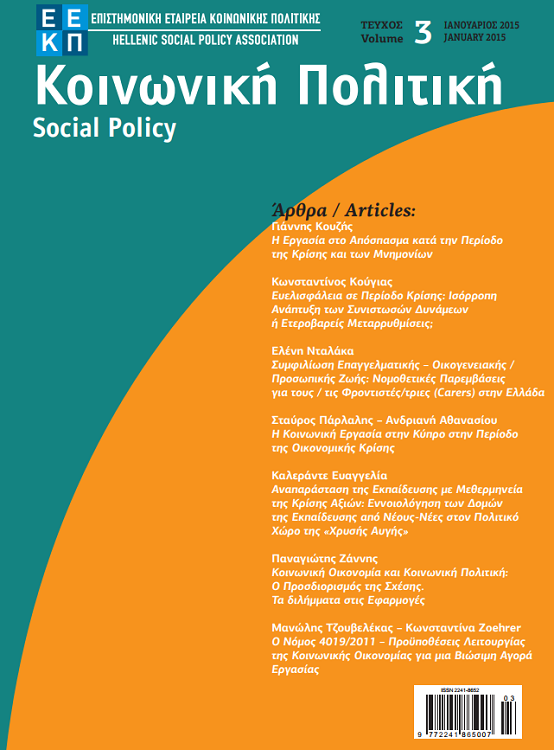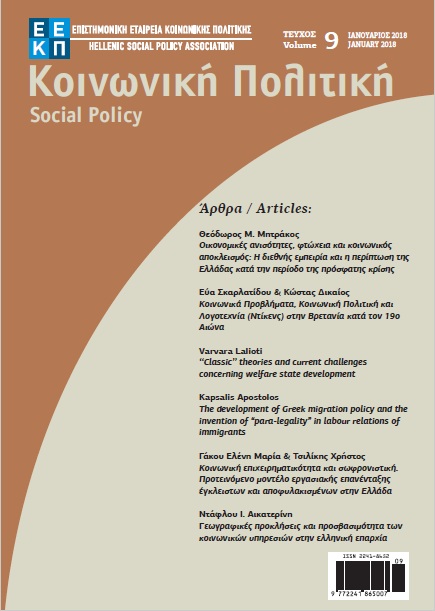Η εργασία στο απόσπασμα κατά την περίοδο της κρίσης και των μνημονίων
Abstract
The changes that take place in the field of employment during the period of the crisis and the Memoranda of Understanding inGreeceare characterized by a violent shake-up of labour relations in the direction of labour deregulation, which has been recorded in the country progressively, but at a slower pace, since the early 1990s. The period of the Memoranda of Understanding (2010-14) that accompany the crisis presents an opportunity for the rapid intensification of the pace of the “labour market’s” deregulation, to the extent that, in such a short time, it contributed to the shaping of an entirely new labour landscape. These developments, in connection with the unprecedented postwar rates of unemployment, decisively affect the content of labour relations and cause serious side effects in the field of the living and working conditions, in combination with the ongoing deregulation of the always deficient welfare state inGreece. The complete disintegration of the system of collective bargaining and the manner of wage formation, the release of individual and collective redundancies, the flexibility of work schedules and the strengthening of flexible forms of work to the detriment of full-time and stable employment are the main pillars of the changes in question. These are coupled with drastic measures of restriction of the employment and degradation of work in the public sector, in the context of the convergence of the labour arrangements of the Public sector with the respective arrangement that is in effect in private enterprises, under terms of complete degradation and deregulation of work. The changes imposed onGreeceby powerful national and international economic circles create a low-cost area of work, suitable for high profitability of capital within the eurozone area. At the same time, they trigger off the expansion of the Greek experiment to the rest of the European South, in a wider context of labour deregulation that has been recorded in the old continent, as a whole, over the past decades, and the adoption by the European Union of interventions in the labour market aiming at the competitiveness of enterprises and the flexibility of work, as their pillar for achieving lower “labour costs”.
Article Details
- How to Cite
-
Κουζής Γ. (2017). Η εργασία στο απόσπασμα κατά την περίοδο της κρίσης και των μνημονίων. Social Policy, 3, 7–18. https://doi.org/10.12681/sp.10587
- Issue
- Vol. 3 (2015)
- Section
- Articles

This work is licensed under a Creative Commons Attribution 4.0 International License.
Authors who publish with this journal agree to the following terms:
Authors retain copyright and grant the journal right of first publication with the work simultaneously licensed under a Creative Commons Attribution Non-Commercial License that allows others to share the work with an acknowledgement of the work's authorship and initial publication in this journal.
Authors are able to enter into separate, additional contractual arrangements for the non-exclusive distribution of the journal's published version of the work (e.g. post it to an institutional repository or publish it in a book), with an acknowledgement of its initial publication in this journal.
Authors are permitted and encouraged to post their work online (preferably in institutional repositories or on their website) prior to and during the submission process, as it can lead to productive exchanges, as well as earlier and greater citation of published work.





